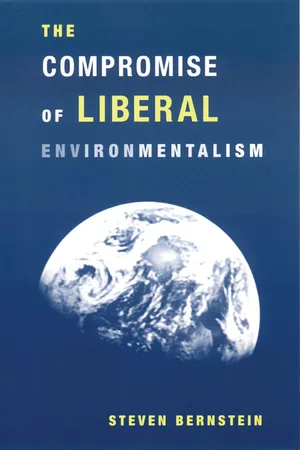
- English
- ePUB (mobile friendly)
- Available on iOS & Android
The Compromise of Liberal Environmentalism
About this book
The most significant shift in environmental governance over the last thirty years has been the convergence of environmental and liberal economic norms toward "liberal environmentalism"—which predicates environmental protection on the promotion and maintenance of a liberal economic order. Steven Bernstein assesses the reasons for this historical shift, introduces a socio-evolutionary explanation for the selection of international norms, and considers the implications for our ability to address global environmental problems.
The author maintains that the institutionalization of "sustainable development" at the 1992 United Nations Conference on Environment and Development (UNCED) legitimized the evolution toward liberal environmentalism. Arguing that most of the literature on international environmental politics is too rationalist and problem-specific, Bernstein challenges the mainstream thinking on international cooperation by showing that it is always for some purpose or goal. His analysis of the norms that guide global environmental policy also challenges the often-presumed primacy of science in environmental governance.
Frequently asked questions
- Essential is ideal for learners and professionals who enjoy exploring a wide range of subjects. Access the Essential Library with 800,000+ trusted titles and best-sellers across business, personal growth, and the humanities. Includes unlimited reading time and Standard Read Aloud voice.
- Complete: Perfect for advanced learners and researchers needing full, unrestricted access. Unlock 1.4M+ books across hundreds of subjects, including academic and specialized titles. The Complete Plan also includes advanced features like Premium Read Aloud and Research Assistant.
Please note we cannot support devices running on iOS 13 and Android 7 or earlier. Learn more about using the app.
Information
Table of contents
- Cover
- Half title
- Title
- Copyright
- Contents
- List of Acronyms
- Preface and Acknowledgments
- Chapter 1. Introduction
- Chapter 2. From Environmental Protection to Sustainable Development
- Chapter 3. Environment, Development, and Liberal Environmentalism
- Chapter 4. Epistemic Communities, Science, and International Environmental Governance
- Chapter 5. Economic Ideas, Social Structure, and The Evolution of International Environmental Governance
- Chapter 6. Conclusion
- Notes
- Bibliography
- Index